Samuel Rogers
1789-1877
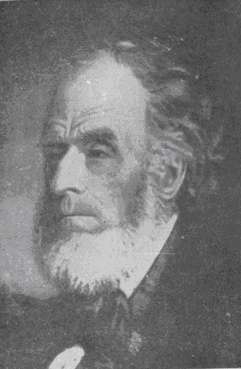
Biographical Sketch On The Life Of Samuel Rogers
Many who had an active part in the early days of the "Restoration Movement" have been forgotten; only the most prominent are remembered. Very much like the generals and leaders of carnal warfare: only the prominent leaders find a place in history, while the rank and file of the army, who bore the burden, are forgotten. Samuel Rogers has almost been forgotten.
He was born in Charlotte County, Va., on November 6, 1789. His father, Ezekiel Rogers, emigrated from England and settled in Virginia. In 1793 his father moved from Virginia to Central Kentucky. The subject of this sketch was only four years old at that time, hence he was reared in Kentucky. His father next moved to Missouri and lived there until 1809, when he moved back to Kentucky. In 1812 Samuel Rogers married Elizabeth Irvin. The Irvin family had been reared after the strictest sect of Presbyterianism. A few years before Samuel Rogers married into the family the shackles of Presbyterianism had been broken and the Irvin family was liberated. Barton W. Stone held a revival meeting near the Irvin home, and the Irvin family became great admirers of Mr. Stone and were led by him away from the slavery of denominationalism and into the freedom that is in Christ Jesus. Later Samuel Rogers heard Mr. Stone preach and became a firm believer in the teachings of the New Testament. He became a Christian soon after his marriage.
The War of 1812 disturbed his peaceful relationship to the church. Mr. Rogers enlisted as a soldier and helped in the great war to rebuke England, the mother country, the second time. During the war he became estranged from the house of worship and became very indifferent toward the religious life. He says that "licentiousness and corruption, the natural offspring of war, had taken the place of virtue and good order in my life." Very few young men who engaged in that war held fast to the integrity of the Christian life. It may be said that such is the usual result of war. Soon after the war closed he began to turn his attention to the religious life. This was largely due to the influence of his wife and her interest in the New Testament. He soon began taking public part in the worship. He began by exhorting his brethren and sisters to live a holier life. He was impressed that he ought to do all that he could for his Lord.
He began preaching the gospel as he began the Christian
life with earnestness and faith. Many were the hardships to be endured at that
time, but he was glad to be counted worthy to suffer and endure for the sake of
preaching the gospel to a dying people. He says: "We did not look for a salary,
passage, or anything of this kind. We went without purse or scrip and often
without our meals, because we had nothing to buy with, and had to swim rivers
because we had no money to pay the ferryman." He was encouraged by others and
was told that the Lord had a great work for him to do, and that he should be
humble and prayerful in doing this work and the Lord would be with him. The
encouragement of his brethren had much to do with his success. I sometimes think
that older brethren in the church today do not encourage younger ones enough. I
am sure that flattery has ruined many a young preacher, and that good nun have
refrained from giving to young preachers words of encouragement because they
were afraid they would spoil them. Prudent encouragement has never worked any
evil, but has helped many a soul that was almost in despair.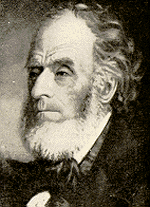
After preaching a few years in Kentucky, Samuel Rogers moved to Clinton County, Ohio. He began at once preaching there to his neighbors and soon gathered together a little band of Christians who met for worship in the schoolhouse. People listened attentively through his preaching, and he was called upon daily to baptize people. He says that at that time he had not learned very much of the New Testament, and especially had not learned that "baptism was an absolute condition to church membership." He, like many others at that time, gradually came into a fuller knowledge of the truth. Later his attention was called to the New Testament teaching on church membership, and he began to baptize "for the remission of sins." He was to busy that he had but little time with his family. The demands for his services were very urgent. The "calls to preach" were not made by churches, because there were no churches in that section at that time; but these calls were made by those who saw a glimmer of light and wished to be led into the fullness of the light. In after life he said that an idle preacher could not believe the gospel.
If one believes the gospel and loves the salvation of souls, there is always work for him to do. There is no excuse for a preacher's being idle. It is a crime against one's own soul to be idle when other souls are perishing for the truth of God. Samuel Rogers intensely believed this and was always busy. He established churches wherever he went. He was impressed with his mission in life, that it was not to seek pleasure, wealth or earthly fame, but it was to do good, and that one can do no better than to be preaching the gospel of Christ.
He made journeys into Missouri and preached the gospel there. He was the first to preach the gospel in St. Louis, a small town at that time. Wherever he held a meeting he established a church, and many churches in Missouri, Kentucky, Ohio, and Indiana were established by him. It is to be regretted that these churches have departed from the ancient order. He made tours through Virginia and Pennsylvania. He had read the Christian Baptist, published by Alexander Campbell, but up to this time had never met Mr. Campbell. While on a tour through Virginia he met him. This was in 1825. He heard him preach, and was greatly impressed with the piety and learning of Alexander Campbell. He afterwards said of Mr. Campbell that he did not "speculate or dogmatize, but pleaded with all the earnestness and confidence of an inspired man for the restoration of the ancient order of things, for apostolic doctrine and discipline." Of the first sermon that he heard Mr. Campbell preach he says: "With facts and documents completely overwhelming he demonstrated the fact that the church had apostatized from primitive faith and practice, and that the only remedy left us was in going back to the days of divinely inspired teachers and in adopting their doctrine and practice as our infallible guide." More clearly did Samuel Rogers see than ever before that human standards might be good or bad; that human teachers might be right or wrong, but that the holy men of God, who spoke as they were moved by the Holy Spirit, could not by any possibility be wrong, and that the only safe course to follow was to teach what the inspired men taught and practice what they practiced.
Samuel Rogers had but little learning. He attended school but a few days in his early life. However, he was blessed with a strong intellect and an abiding faith in God's word. In his simple way he reached the hearts of the common people and led them closer to God. He was greatly distressed because of the division that existed among denominations. He did not see as clearly as some others the New Testament teaching on the church of God, but he did see the evils and unscripturalness of division. He reached the conclusion that men can never agree on opinions; that opinions have no binding authority, and should have none; but that in matters of faith men may be united, and that all that is needed for the accomplishment of this union is that men should lay aside their opinions and have a high regard for the plain teachings of God's word. There should be but one mind and one heart in matters of faith. He saw that so long as men cling to tradition and boldly set aside God's word there can be no union. He said: "If the day should ever came when the whole Christian world shall hold God's word in greater reverence than they do human traditions and speculations, then the whole Christian world will be one. I may be charged with a want of Christian charity, but I shall die in the opinion that nothing but a criminal contempt for God's word is at the bottom of all divisions." Such teaching as this should be emphasized today; and if we should remember nothing else that Samuel Rogers taught, the above is well worth our remembering his work upon earth.
Though he had no education, yet he had a burning zeal for the righteousness which is through faith. He loved to preach the gospel because it is God's power to save. He says it was easy for him to preach. "The story was plain and easy to tell. There was nothing to do but open my Bible and let it tell to a perishing world the way of salvation. It was not necessary to warp or twist a single word or sentence." He was baptized into Christ by Barton W. Stone, and among the hundreds that he baptized into Christ was Benjamin Franklin.
—From Biographical Sketches Of Gospel Preachers, H. Leo Boles, Gospel Advocate Company, Nashville, Tennessee, 1932, pages 52-56
Note: The work of preaching was something others in the family did as well. His brother, John Rogers was one of the most noted preachers in the early days of the Restoration Movement. He is buried at Carlisle. His sons also preached, John I. Roger and William C. Rogers. Samuel passed from this life June 23, 1877 at the age of 87. He was a great servant of the Lord.
![]()
Samuel Rogers Story: In His Own Words
"I was born in old Virginia, November 6, 1789; moved to Kentucky in 1793; settled in Clarke county, Kentucky, until 1801. Moved then to Missouri, called Upper Louisiana, then under Spanish rule. My mother, a pious Methodist, sewed up her Bible in a feather bed to keep the priests from finding it. This was the only Bible I ever saw until I was grown. My father urged my mother to leave her Bible, as it might give her trouble in this new territory, but she said she must have it to read to her children, and she did read it to us much, and by her piety and counsels tried to impress its truths upon our minds and hearts. As I was the eldest child, this was all the preaching I heard until a grown man.
"After my mother had taught me to write my name and spell a little, I was sent to school three months. At the end of this time, I graduated with honor, having learned to read, write and cypher to the rule of three. This was about all our teachers knew themselves. My mother"s readings, prayers and counsels gave me early a high regard for her religion. Though my proud heart often rebelled, yet a mother"s voice would bring me back to sober reflection again. I heard a Methodist preach the first discourse I ever listened to; soon after, I heard a Baptist. I liked the free salvation of the Methodist, but disliked his baptism. I liked the baptism of the other, but disliked his Calvinism. I returned to Kentucky about nineteen years old, and found a great stir occasioned by the late strange revivals under B. W. Stone and others. Many abused Stone, while others praised him; I, however, went to hear him for myself, and was much pleased. He called on all to come to Christ, and invited all to lay aside their creeds and take the Bible as the only rule of faith and practice. I was pleased with his preaching: it sounded like the truth—like the religion I had read of. Whatever may have been said of the errors of Stone and those people, it was evident they were spiritually minded, and the most prayerful people of their times. I was baptized by Stone, 1812. The war came on, and the Church became greatly demoralized; and I among the rest was by no means exempt from its unhappy influences. However, after the war, through the preaching of Stone and others, we all got to work again, renewing our covenants with God, and a glorious revival followed. I became an exhorter by necessity. We held little meetings from house to house, and often had to send for a preacher to baptize our converts. The preachers told me I was called of God to preach, I had not thought of being a preacher, but being convinced by their arguments that I was divinely called, I was ordained by Stone at Caneridge fifty-two years ago. He then gave me a Bible, saying: ‘Preach its facts, obey its commands and enjoy its promises." I was greatly troubled about my call. I contended that if I was called, as were the apostles, I ought to have their credentials and be able to prove my apostleship. I attempted to draw from dreams and visions and vague impressions, some super-human aid; often went on long tours upon a mere impression of the mind, taking it as a call. I thought I ought to perform miracles. My mind was often in a wretched state. About this time I got the ‘Christian Baptist' and found relief. I believe I should have gone crazy but for Alexander Campbell. I was not slow to embrace his view, but knew it to be truth the very moment I saw it, and at once and in haste adopted it. This was about 1825. I had traveled thousands of miles, preached all over the wilds of Ohio, Indiana, Illinois, Missouri—swam rivers, exposed myself to every danger, saying, ‘Wo is me if I preach not the gospel!" I was ardent, impulsive, enthusiastic, and my labors were greatly blessed. But a heavy gloom hung over me when I would think of my call and compare it with that of the apostles.
"Bless the Lord! Alexander Campbell came to my relief. His debate with Walker, and then his debate with McCalla waked up the people, and to me it was like the rising up of the sun after a long gloomy night. I heard him at Wilmington, Ohio, on his first visit. I compared him to Ezra of old, that great reformer who restored to Israel the lost law of God. Stone had given me the book, but Campbell taught me how to read it in its connection. I took his first periodical, the ‘Christian Baptist," and since that time have taken and read everything he ever published. I owe him more than any man since apostolic times. He preached no new gospel and brought in no new God, but taught us to worship intelligently the God whom we had ignorantly worshiped, and to go back over the heads of all human teachers to the great Fountain of truth for our faith and practice.
"Alexander Campbell taught as no other man, but with a clearness and simplicity that carried at once conviction to the mind of every man of common sense. He gave me the New Testament he published, with preface and appendix. I have it yet. It is the best of all new translations; his preface and appendix are invaluable.
"I have sacrificed my whole life for this cause-received almost nothing for twenty-five years of the time. Baptized my thousands—I think seven thousand, as near as I could tell—but have a beautiful home ready for me on the other side of Jordan. I am in my eightieth year, preach yet much, my voice as good as ever; can speak in the open air so as to be heard by one thousand people. Amen."
-From the pen of Samuel Rogers, Excerpt from Memoirs of Alexander Campbell, volume 2, pages 331-333
![]()
Audio Lectures
Click On Icon Above To Download Your
Free Copy of Real player
Life of Samuel Rogers Lecture By Don Deffenbaugh (2.8 Megs; 45:33 Min.; Lecture Done At Faulkner University In 1998. Good Overview Of Rogers' Life)
![]()
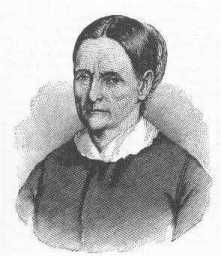
Elizabeth Irvine Rogers
Directions To The Graves
GPS Location
38°23'41.1"N 84°17'47.7"W
or D.d. 38.394750,-84.296588
Cynthiana, Kentucky was the home of Samuel and Elizabeth Rogers. At their deaths, they were laid to rest in what is now the Old Cynthiana Cemetery. Located on N. Main Street just before the railroad tracks on the right (east) side of the street, the cemetery has long been abused and neglected. It was the only cemetery for many years, but cattle were allowed to graze there many years ago, resulting in most of the strones being destroyed. Still preserved are those of the Rogers plot. They are located very near the N. Main Street, and can be easily identified by the photo below, the two slabs to the right of a whitened monument. The only identifiers on the slabs are faintly imbedded, the letters, "S. R." for Samuel Rogers and "E. R." for Elizabeth Rogers. Hopefully someday a more informative bronze plaque or granite marker can be placed there.
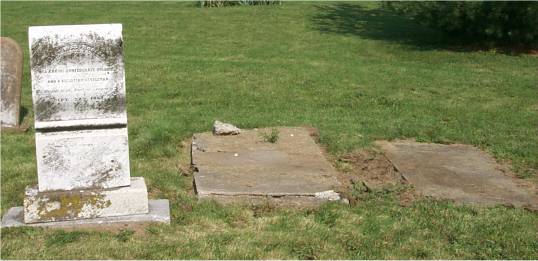
On Left: Capt.
W.S. Rogers (son of Samuel & Elizabeth killed in the Civil War)
Then,
Elizabeth Rogers (Center) and Samuel Rogers (Right)
![]()
Writing On W.S. Roger's Stone:
Capt. W.S. Rogers
was a brave confederate soldier
and a Christian Gentleman
He fell in the Battle of Augusta
Sept. 27, 1862.
“May He Rest In Peace.”
![]()

S. R.
(for Samuel Rogers)
![]()
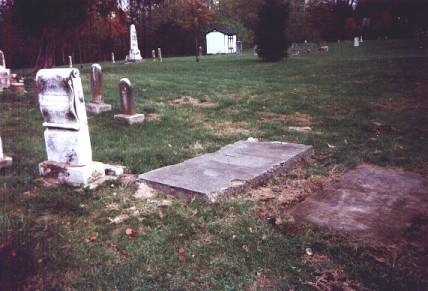
Samuel R. Rogers, Cynthiana, KY, Old Grave Yard, Hwy 27 N.
![]()
Searching For And Finding The Graves Of Samuel & Elizabeth Rogers
My young family, along with my parents, Richard and Dixie Harp, took a trip to Kentucky on Restoration Movement vacation in 1998. We were staying about 75 miles away from Cynthiana Taylorsville. We made the trip initially to Cynthiana not knowing where Rogers was buried. Upon arriving in town we came across an old cemetery across from Walmart. We walked all over the cemetery, not finding any "Rogers" there. We later found out that it was an old "Blacks - Only" cemetery. We went to the local library where we found old records of the burial place of the old pioneer preacher, Samuel Rogers. He was buried in the old cemetery at the north end of Main St. in town. As we were leaving the librarian told us not to be too disappointed if we couldn’t find the grave as it had been vandalized through the years, and even used as a cow pasture at times. Many of the stones had been broken or stolen. This concerned us but we went to search anyway. Traveling north on the main street, we passed the Christian Church where Rogers probably attended and preached. When we got to the end of town we saw that cemetery and our hearts fell. There were no more than thirty stones in the whole field, and this had been the main city cemetery for 70 years. We got out and looked around anyway. The only "Rogers" we found was a Capt. W.S. Rogers who had died as a Confederate soldier. We left Cynthiana disappointed, but knew that we at least had been at the cemetery where old Samuel and Elizabeth, his wife, were buried.
Later that night, back at the Time Share, I was reading through John T. Brown’s Churches of Christ on the life of Samuel Rogers. I had read it before, but had not noticed that at the end he explains that Rogers is buried right next to his son, Capt. W.S. Rogers. After I pulled my chin off the floor, I looked at A.W. Fortune’s book The Disciples In Kentucky, where he had a page full of pictures of gravesites of pioneer preachers. One picture was that of Samuel Rogers. It was a flat stone, flush with the ground. I then thought that I must have missed it because the grass may have grown over it.
So, the next morning, Jenny, Dad and I drove the 75 miles back to Cynthiana where we walked straight to the graves of Samuel and Elizabeth Rogers. Samuel’s grave was partially grown over by grass, so I gently pulled the grass away. The writing on the old stones are nearly faded away, but perhaps you can see in the picture above the initials, "S.R." Sadly this stone is all but forgotten. I’m glad we went back. I won’t forget it!
-Scott Harp
![]()